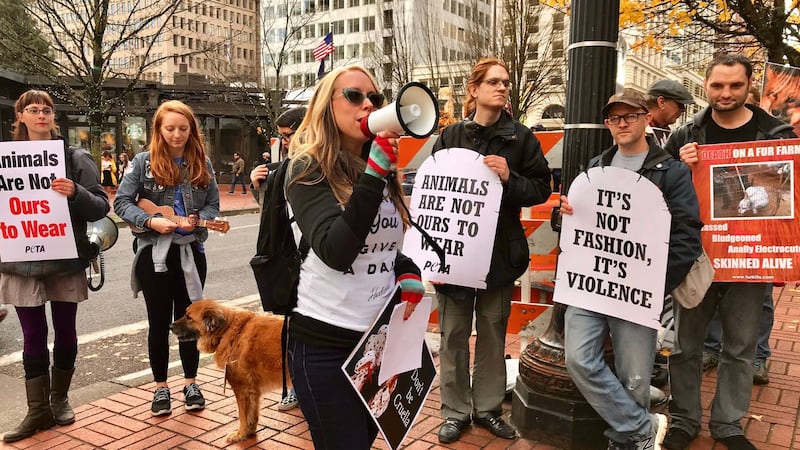Welcome Back to Lady Things. Let's talk about vegans being vegans this week, shall we?
Last month Willamette Week published a letter from a passionate animal rights activist who was critical of an earlier article that celebrated the return of fur as a fashion trend. In the December 18th article "Actually, Fur is Bad and Shame on People Promoting It As A Cool New Trend", Dani Rukin wrote "Right now, the U.S. Administration has determined that certain immigrants, many desperately fleeing unimaginable violence in their country-or-origin, are 'invasive. Is that the kind of world we want to live in?"
Then earlier this month, inspired by the demonstration in front of the Willamette Week offices, animal rights activists staged a protest in front of Will Leathers, the storefront for a family-owned business based out of Eugene. They picked the store because of the foot traffic, even though their protest seemed to have no impact on business whatsoever.
Now, I love animals and agree that floor-length fur coats sold out of high-end boutiques or whatever are really not cool. I was ruined for days after watching that video of the elephant who cried while being rescued from chains and taken to a sanctuary. Seriously, I'm not going to even link to it because it'll just make me upset all over again. You can Google it if like, you really need to see a crying elephant because it'll somehow make your day better. Be my guest.
It's just that you lose me when you start comparing the plight of animals to that of immigrants and other human rights abuses in an attempt to gain support for the better treatment of animals. Showing the suffering of animals alongside that of humans is a tactic used throughout the animals rights movement, and it's not uncommon to see memes depicting pigs hanging from meat hooks next to photos of black people being lynched, for example.
Not only is it shitty to compare humans to animals in this way, this does nothing for the humans whose suffering is being used as a rhetorical ploy. I saw a discussion about this on Facebook a while back where Chincanx community activist Carlos Covarrubias pointed out that the only thing this tactic achieves at best is improving conditions for animals. I couldn't find the original post, so I reached out to him about it.
"I'll reiterate," he wrote back, "that animal rights don't trickle down to human rights. That is some white folk logic if I've ever heard it."
This is a crucial point to make in regards to the animal rights movement, which oftentimes finds itself at odds with immigrants and other people of color. PETA applauded Sheriff Joe Arpaio for serving vegan food in his infamous tent prison, and prescriptivist attitudes about diet and nutrition have deep racist and classist implications. Activists in Canada have also had issues with Native peoples in regards to seal hunting, resulting in decades-long a clash over Indigenous food traditions.
So remember, it's okay if you want to be an advocate for animals, that's very noble, but using immigrants and other marginalized groups as rhetorical fodder is really not cool. There are ways to advocate for a more just world for both humans and animals without resorting to sensationalist rhetoric. Just think of it as ethically sourcing your activism, or something.
That's it for this week, thanks for stopping by.
